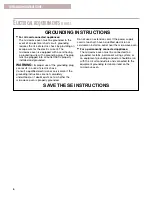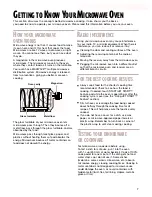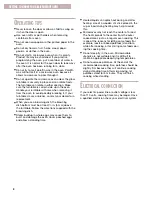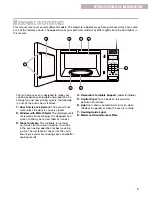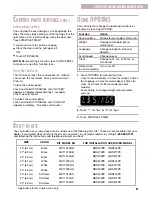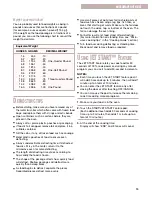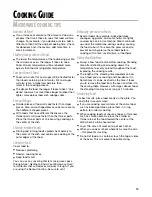
M
ICROWAVE COOKING TIPS
(
CONT
.
)
Using aluminum foil
Metal containers should not be used in a microwave
oven. There are, however, some exceptions. If you
have purchased food which is prepackaged in an
aluminum foil container, refer to the instructions on
the package. When using aluminum foil containers,
cooking times may be longer because microwaves
will penetrate only the top of the food.
If you use aluminum containers without package
instructions, follow these guidelines:
•
Place the container in a glass bowl and add some
water so that it covers the bottom of the container,
not more than
1
⁄
4
in. (.64 cm) high. This ensures even
heating of the container bottom.
•
Always remove the lid to avoid damage to the oven.
•
Use only undamaged containers.
•
Do not use containers taller than
3
⁄
4
in. (1.9 cm).
•
Container must be at least half filled.
•
To avoid arcing, there must be a minimum
1
⁄
4
in.
(.64 cm) between the aluminum container and the
walls of the oven and also between two aluminum
containers.
•
Always place the container on the turntable.
•
Reheating food in aluminum foil containers usually
takes up to double the time compared to reheating
in plastic, glass, china, or paper containers. The
time when food is ready will vary depending upon
the type of container you use.
•
Let food stand for 2 to 3 minutes after heating so
that heat is spread evenly throughout container.
Cooking you should not do in your microwave oven
•
Do not do canning of foods in the oven. Closed
glass jars may explode, resulting in damage to the
oven.
•
Do not use the microwave oven to sterilize objects
(baby bottles, etc.). It is difficult to keep the oven at
the high temperature needed for sterilization.
M
ICROWAVE
O
VEN
C
ARE
To make sure your microwave oven looks good and
works well for a long time, you should maintain it
properly. For proper care, please follow these
instructions carefully.
For interior surfaces: Wash often with warm, sudsy
water and a sponge or soft cloth. Use only mild, non-
abrasive soaps or a mild detergent. Be sure to keep
the areas clean where the door and oven frame touch
when closed. Wipe well with clean water. Over time,
stains can occur on the surfaces as the result of food
particles spattering during cooking. This is normal.
For stubborn soil, boil a cup (250 mL) of water in the
oven for 2 or 3 minutes. Steam will soften the soil. To
get rid of odors inside the oven, boil a cup (250 mL)
of water with lemon juice or vinegar.
For exterior surfaces and control panel: Use a
soft cloth with spray glass cleaner. Apply the spray
glass cleaner to the soft cloth; do not spray directly
on the oven.
NOTE: Abrasive cleansers, steel-wool pads,
gritty wash cloths, some paper towels, etc., can dam-
age the control panel and the interior and exterior
oven surfaces.
To clean turntable and turntable support, wash in
mild, sudsy water; for heavily soiled areas use a mild
cleanser and scouring sponge. The turntable and
turntable support are dishwasher-safe.
20

